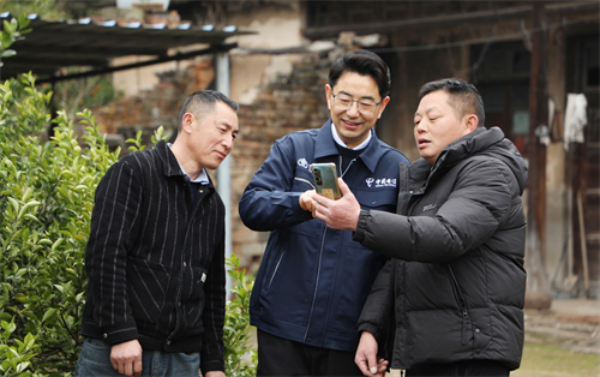Zong Qiang, who runs his own team at China Telecom Corporation Limited’s Fuzhou Branch in East China’s Jiangxi Province, used to be called a technical worker, now he’s a “digital service expert”.
Over the past 30 years and more, Zong, who is also a deputy to the National People’s Congress (NPC), has navigated communication rooms, farm fields and enterprise workshops, persistently taking innovative steps to provide digital services for various industries.

Zong Qiang runs his own team at China Telecom Corporation Limited’s Fuzhou Branch in East China’s Jiangxi Province. [Photo/sasac.gov.cn]
As a grassroots model worker in the information and telecommunication industry, Zong leads his team to the frontline of various sectors, actively guiding enterprises in their digital transformation.
He spearheaded the establishment of an Industrial Internet of Things (IoT) Joint Innovation Laboratory, focusing on the manufacturing industry’s core concerns about “cost, quality and efficiency”. His efforts in creating a 5G fully connected factory have contributed to the achievements of streamlined production processes, balanced production and quality improvements.
Zong and his team have provided services to over 100 enterprises, solving more than 150 technical challenges.
“The demands of enterprises are the direction of our effort. We must use information technology to solve problems for enterprise development,” he said.
When Jiangxi Weile Technology Co., Ltd, a national high-tech enterprise in Fuzhou, approached Zong’s company to solve the problems of data silos and low productivity, Zong and his team tailored a “5G + Industrial Internet” solution.
Through device connectivity, real-time data collection and intelligent analysis, they helped the company optimize the production process. Post-transformation, the enterprise saw a 25 percent increase in productivity and a 10 percent reduction in energy consumption, saving millions of yuan annually.
Zong’s digital services have also empowered agricultural development and rural revitalization.
In Guoxu Township, Chongren County of Jiangxi Province, Zong and his team conducted in-depth research to understand local needs and rural management challenges.
Utilizing 5G, IoT, and big data technologies, they developed the “Village Code Online 5G + Long-term Management Platform.” This platform allows villagers to report issues promptly so as to make rural management become more precise and scientific.
To promote local agricultural development, Zong and his team helped install IoT sensors in the farm fields to monitor soil moisture and pest data in real-time, and established a digital platform for vegetable production. By leveraging digital tools and AI algorithms, they offer intelligent agricultural services, turning data into a boost for rural revitalization.
“Since Zong introduced artificial intelligence technology (in our base), labor input has decreased and both yields and quality have been improved,” said Cai Guangrong, the production manager of Liyuan Agricultural Base. “Now, the cucumber yield in the greenhouse reaches 2,500 kg per mu (1/15 hectares) per year, doubling compared to traditional cultivation. The taste and quality have also improved.”
As an NPC deputy, Zong is fully prepared for the upcoming third session of the 14th NPC, which will open on March 5 in Beijing. With the earnest expectations of grassroots communities, he is ready to fulfill his duties, striving to create a new digital future.
(Executive editor: Wang Ruoting)